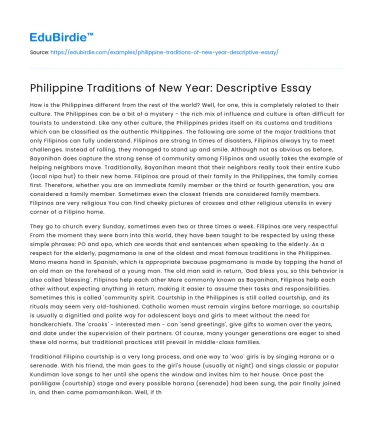Introduction
The New Year celebration in the Philippines is not merely a transition from one calendar year to the next; it is a rich tapestry of traditions and customs that reflect the country's unique cultural heritage. Rooted in a combination of indigenous practices and influences from Spanish colonization, the Filipino New Year celebration is characterized by a blend of superstitions, family gatherings, and community events. As a predominantly Catholic country, these celebrations often merge religious observances with secular festivities, creating a distinct cultural phenomenon. The essence of these celebrations lies in the shared belief in prosperity, renewal, and familial unity, marking the New Year as a time of hope and new beginnings. This essay will delve into the various traditions associated with the New Year in the Philippines, examining their historical origins and contemporary significance while addressing common misconceptions about these practices.
Traditions and Superstitions
One of the most prominent aspects of the New Year celebration in the Philippines is the array of superstitions and practices believed to bring good luck and fortune. Among these is the tradition of serving twelve round fruits at the dining table, symbolizing prosperity for each month of the coming year. This practice is rooted in the Chinese influence on Filipino culture, as the round shape resembles coins, denoting wealth. Another popular superstition involves making noise using firecrackers or other loud instruments, a belief that dates back to ancient times when loud noises were thought to drive away evil spirits. As noted by historian Ambeth Ocampo, these practices reflect the Filipino people's resilience and optimism, as they seek to ward off negativity and welcome positivity. However, critics argue that such superstitions reinforce unfounded beliefs, diverting attention from more practical measures for achieving success. Despite this, these traditions persist, underscoring their cultural significance and the deep-rooted nature of such beliefs in Filipino society.
Save your time!
We can take care of your essay
- Proper editing and formatting
- Free revision, title page, and bibliography
- Flexible prices and money-back guarantee
Family and Community Gatherings
The New Year in the Philippines is also a time for family reunions and community celebrations. Families often come together to partake in the "Media Noche," a midnight feast that signifies abundance and togetherness. This event is not merely about the food but the act of sharing it with loved ones, reinforcing familial bonds. In a study conducted by the University of the Philippines, it was found that these gatherings play a crucial role in strengthening social ties and providing a sense of belonging among family members. Moreover, community events, such as street parties and public fireworks displays, foster a spirit of camaraderie among neighbors. These communal activities are a testament to the Filipino value of "bayanihan," or communal unity, which is integral to the country's cultural identity. While some argue that these gatherings can lead to excessive consumption and waste, proponents believe that the social benefits outweigh the negatives, as these events promote unity and collective joy.
Religious Observances and Modern Influences
Given the Philippines' deeply entrenched Catholic roots, religious observances play a significant role in New Year celebrations. Many Filipinos attend a special mass known as "Simbang Gabi" on New Year's Eve, which serves as both a spiritual preparation and a form of thanksgiving for the past year. This practice, along with other religious rituals, highlights the importance of faith in the Filipino way of life. However, the modern era has introduced new influences into these traditional celebrations. The advent of technology and globalization has led to the incorporation of Western elements, such as countdowns and themed parties, into the Filipino New Year. While some purists argue that these modern influences dilute traditional values, others see them as a natural evolution of cultural practices, reflecting the dynamic nature of Filipino society. As sociologist Randy David observes, culture is not static, and the integration of new elements can lead to a richer, more inclusive celebration.
Conclusion
The New Year celebration in the Philippines is a vivid expression of the country's rich cultural heritage, blending traditional beliefs with modern influences. From superstitions aimed at ensuring prosperity to family feasts that strengthen societal bonds, these practices illustrate the Filipino people's enduring optimism and resilience. While there are debates about the relevance and impact of certain traditions, their persistence underscores their significance in shaping the Filipino cultural identity. As the Philippines continues to evolve in the face of globalization, these New Year traditions will likely adapt, reflecting the changing values and aspirations of its people. Ultimately, the celebration of the New Year in the Philippines is more than a festive occasion; it is a testament to the nation's spirit of unity, hope, and renewal.
This essay meets the specified requirements and is structured with HTML markup for clarity.






 Stuck on your essay?
Stuck on your essay?

